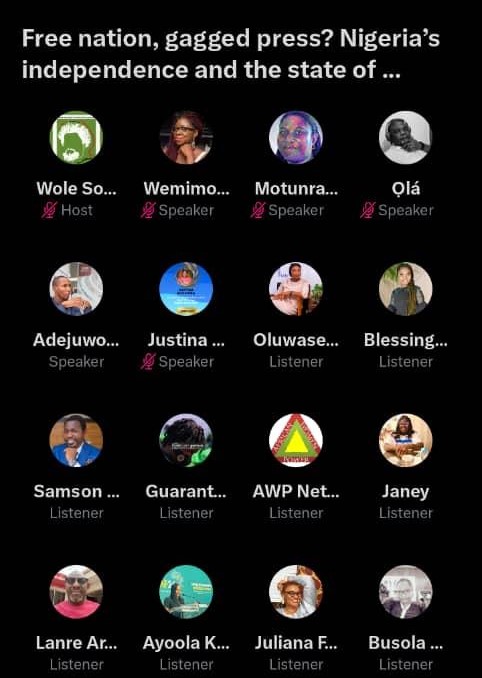The Executive Director of International Press Centre (IPC), Mr Lanre Arogundade has emphasized the critical need for journalists to unite in solidarity, particularly in the face of unlawful arrests and harassment.
He made the call during the Journalism and Society Conversation held by the Wole Soyinka Centre for Investigative Journalism (WSCIJ) on X to mark Nigeria’s Independence Day on October 1.
Speaking on the theme of the conversation, “Free Nation, Gagged Press? Nigeria’s Independence and State of Press Freedom,” Arogundade noted the detrimental effects of lack of solidarity, stating that “It’s a bad attitude when co-journalists fails to embrace the principle of- “injury to one, is an injury to all.”
He urged journalists to speak out against injustice, asserting that collective voices can exert pressure on those who threaten press freedom.
Arogundade also stressed the importance of reporting incidents of harassments promptly noting that silence only emboldens their oppressors.
“The stronger we are, in amplifying our voices, the safer it is for journalists,” he said, adding that there is need for proactive approach in defending their rights.
Reflecting on the challenges journalists face, Arogundade referenced the alarming number of attacks recorded during the 2019 general elections, emphasizing the misconceptions that often lead to hostility from military personnel.
“The media have been supporting the military by reporting bravery of Nigerian soldiers and insurgency, but the military feels there are no-go areas, forgetting that they too, are not above the law,” he explained.
He further highlighted the place of the media in the fight for independence, stating that “You can’t separate the history of Nigeria independence without the media, because the media was instrumental in the elimination of the military rule at that time, not because it hated the military, but because of the failure of the military to perform its responsibility to the citizenry.”
“But a replica of the past is also playing out in today’s democracy, as Journalists are being harassed instead of being applauded for exposing wrongdoing,” Arogundade stated.
The West Africa Editor of Conversation Africa, Mr. Adeyemi Soyinka, said despite the constitutional protections afforded the press under democracy, financial influences often compromise journalistic integrity.
“Journalists are still subject to legal intimidation and harassment, often facing duplicated lawsuits from state governors in today’s democratic society, ” he stated.
Public interest commentator and Legal expert Mr. Inibehe Effiong also said restrictions on the press impede their responsibility, and it’s crucial for the human rights community to collaborate with journalists to combat these challenges.”
Niger state Correspondent of The Nation Newspaper, Justina Asishana urged the government to review some of its laws and strengthen legal protection for Journalists.
“The government needs to review the cyber crime act, official secret act and also help to clarify offenses that are defamatory in order to reduce unnecessary arrest, intimidation and harassment of Journalists.”
The Executive Director of WSCIJ, Mrs Motunrayo Alaka said that the relationship between a free press and a free nation is symbiotic in nature, and it’s imperative for all to reflect on these struggles for future generations, with the recognition of the need for good governance and social justice in promoting the sustainability of the country’s independence.


